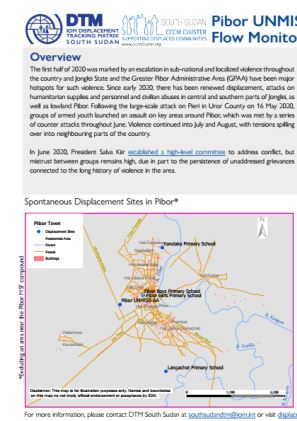-
Countries
-
Data and Analysis
-
Special Focus
-
Crisis Responses
South Sudan — Pibor UNMISS AA Site Flow Monitoring Summary (7—18 August 2020)

Contacter
DTM South Sudan, SouthSudanDTM@iom.int
Langue
English
Emplacement
South Sudan
Période couverte
Aug 07 2020
Aug 18 2020
Activité
- Registration
- Flow Monitoring
- Mobility Tracking
- Site Assessment
The first half of 2020 was marked by an escalation in sub-national and localized violence throughout the country and Jonglei State and the Greater Pibor Administrative Area (GPAA) have been major hotspots for such violence. Since early 2020, there has been renewed displacement, attacks on humanitarian supplies and personnel and civilian abuses in central and southern parts of Jonglei, as well as lowland Pibor. Following the large-scale attack on Pieri in Uror County on 16 May 2020, groups of armed youth launched an assault on key areas around Pibor, which was met by a series of counter attacks throughout June. Violence continued into July and August, with tensions spilling over into neighbouring parts of the country.
In June 2020, President Salva Kiir established a high-level committee to address conflict, but mistrust between groups remains high, due in part to the persistence of unaddressed grievances connected to the long history of violence in the area.
Although attacking groups have largely retreated to their communities, the impacts of the conflict in the first half of the year continue to be deeply felt by local populations. According to PLAN International and the NNGO, CIDO a total of 33,668 Individuals (11,443 households) were registered in early August 2020 at the UNMISS Adjacent Area (AA) and several spontaneous displacement sites throughout Pibor Town. Nearly all households are reported to have returned to Lekuangole and Gumruk by the end of the same month. UNMISS Pibor AA housed 403 individuals according to a DTM headcount conducted on 7 August 2020. Access constraints rendered assessments beyond Pibor Town challenging, limiting available data to the town.
The humanitarian response has been disrupted, further eroding people’s ability to meet their basic needs, which has been compounded by the destruction of civilian property and livelihoods and loss of livestock during recurrent fighting, as well as flooding. While heavy rain could temper the possibility of further violence, the potential for additional violent incidents in Jonglei State and the GPAA, still exists.
